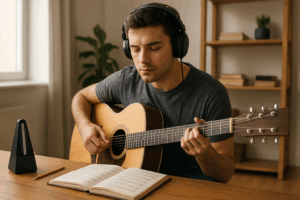Starting your musical journey is one of the most exciting and fulfilling adventures you can embark on. Whether you’re drawn to the elegance of classical piano, the energy of electric guitar, or the expressive range of the human voice, learning music can enrich your life in countless ways. However, as with any new skill, the beginning stages can feel overwhelming. With the right strategies and mindset, though, you’ll be better prepared to stay on track and make consistent progress.
Below are five expanded and essential tips for beginners starting to learn music — practical advice that will help you build a solid foundation while keeping the journey enjoyable.
1. Start with the Basics: Build a Strong Foundation
One of the most common mistakes beginners make is trying to jump straight into complex techniques or play their favorite songs without mastering the fundamentals. While the desire to play impressive pieces is understandable, skipping the basics often leads to frustration and burnout.
Why the Basics Matter
The basics are the building blocks of all music. Whether you’re learning guitar, piano, violin, or drums, foundational skills such as posture, hand position, note recognition, and rhythm awareness are essential.
- For instrumentalists, this means learning major and minor scales, simple chord progressions, and basic finger exercises.
- For vocalists, it means practicing breathing techniques, pitch control, and vocal warm-ups.
- For all musicians, music theory basics like understanding key signatures, intervals, and time signatures are crucial.
Taking the time to build this foundation may feel slow, but it pays off. Advanced techniques become easier, your playing becomes cleaner, and your confidence increases.
Tips for Focusing on the Basics
- Use beginner-friendly method books or online courses that introduce music step by step.
- Don’t worry about speed. Accuracy and understanding are more important at this stage.
- Record yourself regularly to track your improvement and identify areas that need more attention.
2. Practice Regularly, Even if It’s Just for 15 Minutes
Consistency is far more important than duration when it comes to practice. While a long practice session once a week might feel productive, it won’t help you progress nearly as much as short, focused sessions every day.
The Power of Short, Consistent Practice
Practicing regularly helps reinforce muscle memory, improve coordination, and keep the material fresh in your mind. Even just 15 to 30 minutes a day can bring visible results when done consistently.
Make Your Practice Time Count
- Create a schedule: Choose a time of day when you have the most energy and least distractions.
- Set specific goals for each session: For example, “practice left-hand fingering for scales” or “memorize the first 8 bars of a song.”
- Use a timer to stay focused and avoid mindless playing.
Bonus Tip: Keep a Practice Journal
Logging your practice helps you stay accountable and allows you to look back and see how far you’ve come. You can note what you worked on, how it felt, and what needs improvement.
3. Listen to Music Actively: Train Your Ears and Mind
Passive listening is enjoyable, but active listening is a powerful learning tool. As a music student, listening should be an intentional part of your routine, helping you to develop your ear and deepen your musical understanding.
How to Listen Actively
- Choose a piece of music and focus on one element at a time: rhythm, melody, harmony, or instrumentation.
- Try to identify instruments used, the structure of the song (verse, chorus, bridge), and the emotions conveyed.
- If possible, follow along with sheet music or tabs while listening to a recording.
Learn from the Greats
Studying recordings of skilled musicians not only inspires but teaches. Notice how they phrase lines, use dynamics, and interpret rhythms. Try mimicking these qualities in your own playing.
Tools for Better Listening
- Use slow-down apps to dissect fast passages.
- Explore platforms like YouTube or Spotify to discover new genres.
- Consider using transcription exercises to write out melodies by ear.
4. Don’t Be Afraid to Make Mistakes: They’re Your Best Teacher
Every successful musician has made — and continues to make — mistakes. In fact, mistakes are an essential part of the learning process. They highlight where your technique, understanding, or attention may be lacking.
Reframe Your Mindset About Mistakes
Instead of feeling discouraged when something goes wrong, use it as an opportunity:
- Analyze what happened. Was it a finger slip? A misread note? Poor timing?
- Correct it mindfully, and repeat the section slowly until it improves.
- Accept that mistakes mean you’re stretching your abilities, which is exactly where growth happens.
Practice Without Fear
One of the biggest barriers for beginners is perfectionism. Allow yourself to sound “bad” for a while — everyone does at first! Progress is rarely linear, and some days will be better than others.
Build Confidence Gradually
- Record and review your practice to see improvement over time.
- Perform in front of friends or family to reduce performance anxiety.
- Remind yourself that even professional musicians are lifelong learners.
5. Stay Motivated and Enjoy the Process
Motivation is what gets you started, but enjoyment is what keeps you going. Learning music should be a joyful and fulfilling experience, even when progress feels slow.
Keep It Fun
Don’t let your practice become a chore. Incorporate things that excite you:
- Learn a favorite song, even if it’s challenging — break it down into manageable parts.
- Jam with a friend or play along with backing tracks.
- Try improvising or composing something of your own.
Set Realistic, Achievable Goals
Setting goals helps you stay motivated and gives your practice sessions direction.
- Short-term goals: Learn a scale, memorize a simple song, improve timing.
- Long-term goals: Play at a recital, write an original composition, pass a music exam.
Celebrate Your Wins
Whether it’s nailing a tricky chord transition or completing your first full song, acknowledge your progress. Small victories add up and boost your morale.
Surround Yourself with Music
Follow musicians on social media, join online communities, watch tutorials, and attend live concerts when you can. Being immersed in music keeps your passion alive.
Keep Moving Forward: Every Note Counts
Learning music is a journey that unfolds over time. Some days will feel frustrating, while others will feel triumphant. By focusing on the basics, practicing consistently, listening deeply, learning from mistakes, and staying motivated, you’re setting yourself up for long-term success.
Remember: Every great musician was once a beginner — just like you. Keep showing up, keep playing, and keep enjoying the process. Your future self will thank you.




